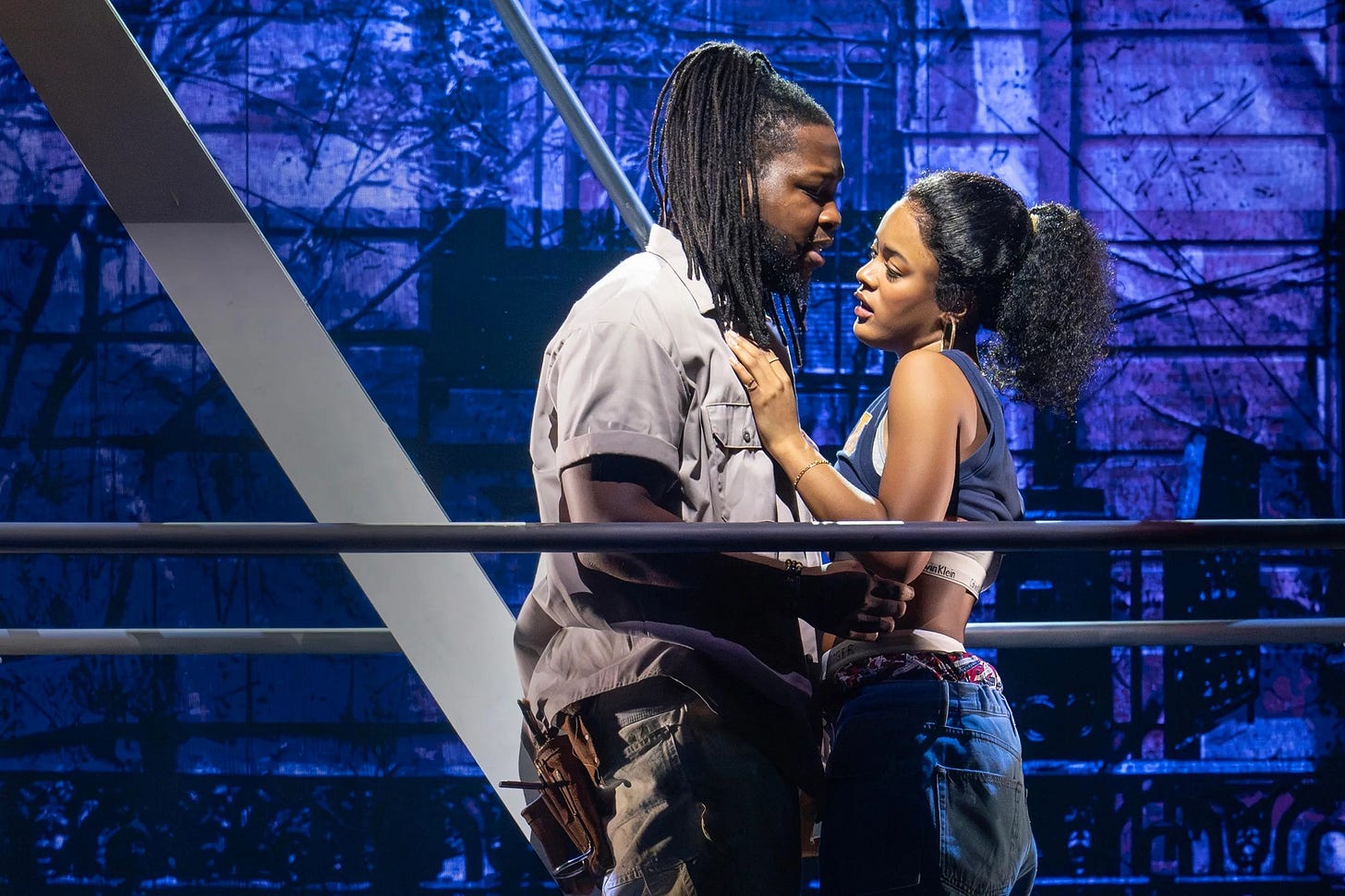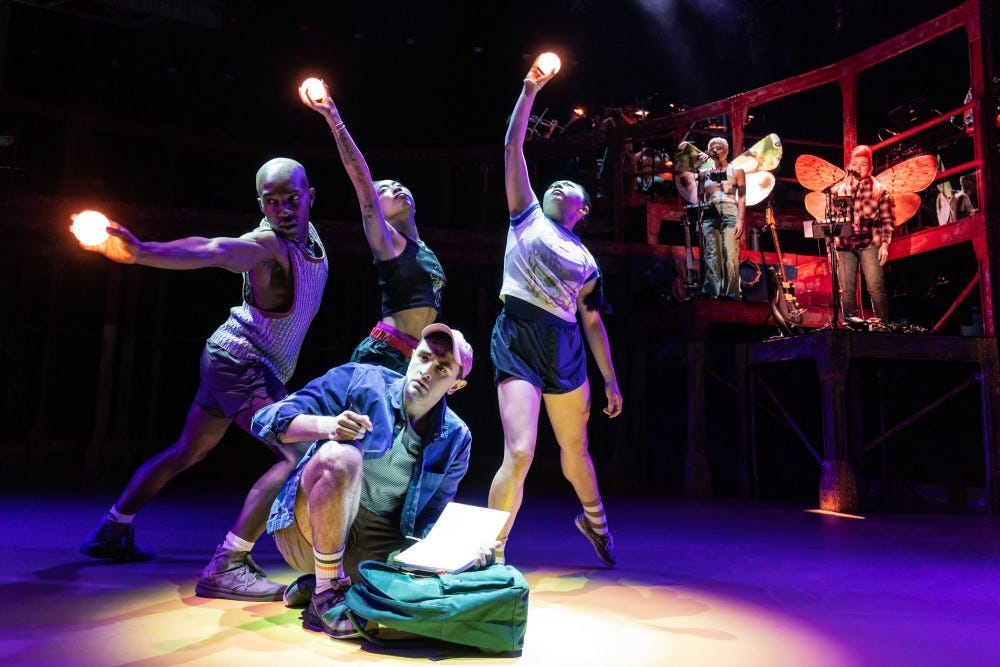Oops!...I did it again
The jukebox shows this season were largely pleasant surprises.
Over the past few weeks, I’ve made my way through several of this season’s shows by looking at the musicals adapted from movies—or adapted from books that were also adapted into movies, work with me here—but there’s another IP-forward genre I haven’t yet touched on: the jukebox musical.
I’ve not been particularly kind to the jukebox musical in the past—and calling it “IP-forward” isn’t exactly generous. But it’s true! Like musicals based on popular films, these shows are designed to appeal to an audience that is already familiar with the material (and therefore more likely to spend $200 on a ticket). When I wrote about last season’s jukebox musicals, I compared the two genres and noted that jukebox shows were a “tougher pill to swallow for me”: “While I’ve seen plenty of terrible musical adaptations of movies, they at least mostly have original scores.” This season, however, I have to be honest: The jukebox shows are superior.
Not all of them, of course, but on the whole, yes, I’ve had a better time at the musicals featuring songs I already knew (or not, given that Huey Lewis was almost entirely brand new to me) than at the adaptations with sadly forgettable original scores. To actually break down why that is—or, more specifically, why I liked what I liked—I’m returning to one of my beloved (by me) rubrics and scoring these shows in five key categories.
Here’s how that works—
Originality of story: Is there something that feels fresh about this story, or is it just telling an artist’s story and falling back on all the most familiar tropes? (X/10)
Preponderance of bops: I don’t think this needs any explanation. How many bops are there? Are they of a high quality? It’s subjective, but I’m right. (X/10)
Integration of music: Are the songs entirely diegetic, and if so, do they still work to move the story forward? If people are breaking into song, does it feel labored? (X/10)
Musical self-awareness: The worst jukebox musicals take themselves (and the artists they’re celebrating) way too seriously. Are we having any fun with the material? Are tongues firmly planted in cheeks? (X/10)
Audience self-awareness: Does the audience know they are seeing a live performance? The more they sing along, the lower this score is. Whether or not it’s fair to blame that on the show, I’m going to. (X/10)
Total score: X/10
I’ll be going through three shows that are still running (two of which are nominated for Best Musical at the Tonys), and one that should still be running, but has been closed for almost eight months at this point. And no nomination for Justin Guarini. How come, Chief Willoughby?
Once Upon a One More Time
Originality of story: OK, look, a feminist subversion of fairy tales is not that original at this point. On the other hand, Cinderella’s self-actualization being directly inspired by Betty Friedan is legitimately creative, as are the mechanics of the world the show builds. (7/10)
Preponderance of bops: Gives you basically every Britney song you could ask for, from the biggest hits to slightly deeper cuts, and ends with a life-changing “...Baby One More Time”/“Gimme More”/“Till the World Ends” megamix. Slight deduction for clumsy changed lyrics. (9/10)
Integration of music: The songs work surprisingly well in context, though as referenced above, that sometimes involves altering the lyrics more than is ideal. Ultimately, you’re so happy to hear all your Britney faves that it doesn’t really matter. (7/10)
Musical self-awareness: Because it’s a jukebox musical that isn’t about the artist’s life (blessedly true of three of these shows!), it really gets to lean into the satire. As with the broader Max Martin jukebox show & Juliet, it still takes the importance of its message a bit too seriously. (8/10)
Audience self-awareness: Unfortunately, I did sit across from a woman singing at the top of her lungs the entire time. That having been said, if more Britney diehards had paid full price for those orchestra seats, the show would still be open. (6/10)
Total score: 37/50
Hell’s Kitchen
Originality of story: Alas, the Alicia Keys jukebox musical falls into the trap of being about Alicia Keys—though it’s really just inspired by the artist’s life and mostly fictionalized. That might be more interesting if the original story allowed for any meaningful conflict. (4/10)
Preponderance of bops: You will hear every Alicia Keys song that you know and a handful that you don’t unless you’re a superfan. (Even then, there’s original music here, too.) Some of the weaker new arrangements do take things down a bit. (7/10)
Integration of music: A mixed bag, really. The book does a decent job of making the songs fit the story, but you kind of wish it wouldn’t give so many of the biggest hits to characters who aren’t Ali. Thankfully, all is forgiven once “Empire State of Mind” closes the show. (6/10)
Musical self-awareness: While it’s sort of about Alicia Keys, it’s not hagiography, so points there. At the same time, it’s often overly sincere, despite not really being about anything. It keeps hinting at bigger, more challenging themes, and then quietly dropping them. (6/10)
Audience self-awareness: Kudos to this audience for resisting the urge to try to match the cast’s stellar voices. A few people joined in on “Empire State of Mind,” but as with “Sweet Caroline” in A Beautiful Noise, how can you not? (8/10)
Total score: 31/50
Hell’s Kitchen is running at the Shubert Theatre. Buy tickets here.
Illinoise
Originality of story: A gay boy falling in love with and losing his straight best friend—and having a lot of feelings about that—is not something most of us haven’t seen and/or experienced. But the show does take interesting (and appropriately heartbreaking) diversions along the way. (8/10)
Preponderance of bops: Does Sufjan write bops? That’s probably not the most accurate descriptor. Nevertheless, we’re talking about songs from a perfect album, reshuffled and sung by very talented artists with gorgeous new arrangements. No complaints here. (10/10)
Integration of music: Without any dialogue, the songs and the dancing do all the heavy lifting, and they do so effortlessly. Knocking off a couple points for the overly literal depiction of some of the lyrics, which probably could have stayed metaphor. (8/10)
Musical self-awareness: Hard to score this one! In most cases when I’m looking at a jukebox show, I’m considering how tongue-in-cheek it is, but there is nothing more sincere than Illinoise. In this case, however, that’s what we need. This show knows exactly what it is. (9/10)
Audience self-awareness: No one is singing along, they’re too busy having gay feelings and suppressing sobs. (10/10)
Total score: 45/50
Illinoise is running at the St. James Theatre. Buy tickets here.
The Heart of Rock and Roll
Originality of story: Do you know what The Heart of Rock and Roll is about? Not Huey Lewis, I can tell you that much! No, this is the story of a man who works for a cardboard box manufacturer but has dreams of rock stardom. More importantly, it’s about the power of love/Corey Cott’s arms. (7/10)
Preponderance of bops: There are definitely bops to be had, but as someone whose only familiarity with Huey Lewis was “The Power of Love” and “Hip to Be Square,” I found the songs to be pretty samey. Nevertheless, the vibes are immaculate. (7/10)
Integration of music: Even though the lead character wants to be a rock star, the vast majority of music isn’t diegetic, which is a pleasant surprise. Does that mean all the songs make sense in context? Absolutely not! (7/10)
Musical self-awareness: What makes this show simply irresistible (that’s a Robert Palmer song, different guy) is how much fun it’s having being a silly ‘80s jukebox musical. It’s also self-aware enough to keep Corey Cott shirtless and/or sleeveless for almost the whole show. (9/10)
Audience self-awareness: I’m sure there are diehard Huey Lewis fans out there, but if there were any in my audience, they were very polite. Everyone also cheered the cardboard box dance number the right amount. (9/10)
Total score: 39/50
The Heart of Rock and Roll is running at the James Earl Jones Theatre. Buy tickets here.




